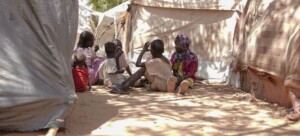Sudanese medical staff on strike in various states
Several medical staff workers’ groups are on strike in Sudan at the moment to protest bad managerial decisions, unpaid salaries, and poor working conditions. In North Darfur, civil servants also went on strike.
 Strike at the El Fasher Teaching Hospital (RD)
Strike at the El Fasher Teaching Hospital (RD)
Several medical staff workers’ groups are on strike in Sudan at the moment to protest bad managerial decisions, unpaid salaries, and poor working conditions. In North Darfur, civil servants also went on strike.
Strikes have become increasingly common in recent months, especially around the 2022 salary structure.
New 2022 salaries were meant to provide increased wages amidst Sudan’s rising inflation. Despite being more than halfway through the year, many workers are still paid their old salaries instead of the increased 2022 wage.
However, strikes are also taking place around mismanagement and working conditions.
General strike
Doctors in Northern State demanded the dismissal of the director general of the state's Ministry of Health. They announced a general strike in all localities of the state starting on Wednesday.
In a statement yesterday, the medics said that the director-general in charge of the Ministry of Health has, from the first moment he assumed his duties, been working on creating problems and ‘issuing dangerous decisions in sensitive files’.
According to the statement, the director-general decided to stop the supply of oxygen to the Dongola Specialised Hospital in the first 72 hours of assuming his duties. He issued another decision disclaiming the Ministry's responsibility for the supply of oxygen to all medical institutions in the state.
He also ordered the Health Ministry not to pay entitlements for the Eid El Adha holiday to medics working for certain hospitals in the second week of July.
The doctors entered into a general strike in the entire Northern State on Wednesday but will make exceptions for medical emergencies.
Strike lifted
The West Darfur Coordination of Medical and Health Personnel announced that it would lift its strike and demanded that workers' issues related to wage improvement be addressed.
In a statement on Tuesday, the Coordination said that it had decided to lift the strike and resume work at El Geneina Teaching Hospital for the next month, starting on Wednesday.
The decision was made during a meeting with the hospital administration and the state’s Health Ministry based on the critical humanitarian conditions in West Darfur and on the emergence of a monkeypox case in Kereinik; the first case in Sudan.
El Fasher hospitals
The patients at El Fasher Teaching Hospital in North Darfur were evacuated from the wards on Wednesday due to the strike of the medical staff in El Fasher hospitals, which entered its second week in a row.
Sources told Radio Dabanga that inpatients in the hospital's internal, orthopaedic, and surgical wards left the wards in search of other places to obtain treatment.
The patients and their families demand the authorities speed up the fulfilment of the medical staff's demands. They pointed to the high costs of treatment and the even higher costs of treatment in private hospitals.
The strike of medics working at the El Fasher Teaching Hospital and the Obstetrics and Gynaecology Hospital in North Darfur that started on July 28, led to a large number of patients and their relatives waiting in front of the two hospitals.
The strike came in response to the North Darfur government's failure to pay its civil servants’ arrears of the new salary increases, and the bonuses for March, April and May.
It is reported that the staff of all state institutions entered into a comprehensive strike, calling on the state government to speed up and respond to their demands.
North Darfur civil servants
The North Darfur High Committee for Claiming the Benefits of Workers launched a week-long general strike for civil servants on Sunday to demand their financial dues and the improvement of working conditions.
Tension arose because of the authorities’ lack of commitment to pay the increased wages according to the new salary structure announced by the federal government in January.
The statement appealed to the workers to adhere to the importance of attending their workplaces, but to refuse to work.
The committee further warned the workers not to respond to rumours and forged statements under the name of the high committee.











 and then
and then